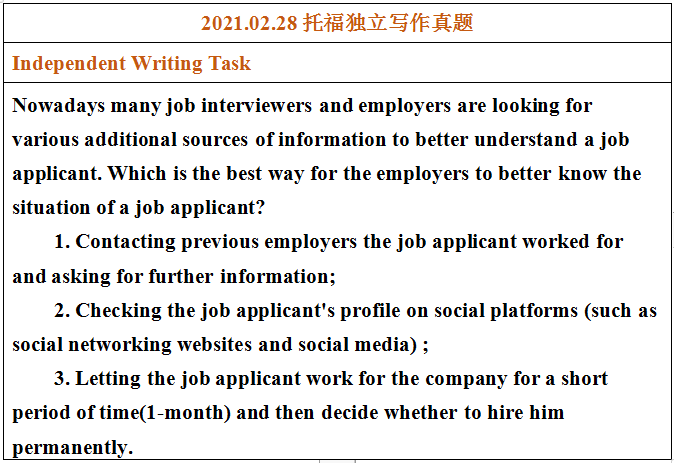

本次综合写作考察生态环境类话题,难度适中,生僻词汇较少。作为托福综合写作考察的高频话题之一,其考点一般涉及生物减少原因,生物保护方法,防止生物扩散的方法等。在TPO中涉及到相关生态环境类话题有TPO14,TPO18,TPO23,TPO41等。希望从这些综合材料能给考生关于这类话题提供可借鉴的解题思路。
Keywords: genetic diversity, marine enhancement progress, extinction, salmon等。
可以类比以下TPO综合写作。
TPO 14
阅读部分:
总观点:回收性砍伐对于森林和经济发展都好处
• 可以为新生树木提供生长空间;
• 可以避免虫害伤害森林;
• 有助于经济发展。
听力反驳:
总观点:回收性砍伐利大于弊
• 回收性砍伐会使森林土壤失去营养;
• 回收性砍伐会使鸟类和昆虫失去栖息地,长久看来对森林无益;
• 回收性砍伐经济利益很小。
TPO41
阅读部分:
总观点:不应对于coal ash的处理和储存实施更严格的法规。
• 有效的法规已存在;
• 人们不再买recycled coal ash product;
• 增加电力成本。
听力反驳:
总论点:三个理由都错误
• 只在new pond有法规,old pond没有法规,且已发生环境危害;
• 以人们对recycled mercury product的反应举例,说明对coal ash的严厉法规不会影响对于recycled coal ash的购买。
• 以家庭为单位的用电成本不会上涨太多,为了环保也很值得。

题目解析:
托福年后线下第二场考试,独立写作部分是一道新题,且题目长度令人咋舌。但以“三选一”形式考察工作类话题,本题难度并不大。
虽然是新题,但实质还是一个数次被考过的老题目——“信息获取”,参见2018年7月14日独立写作“旅游信息的获取”和2020年10月24日(重复2019年10月26日)独立写作“求职信息的获取”。其常见考察内容有,“向他人寻求信息”和“从网络获取信息”,考生需要熟知两种方式的优缺点。本文选择第三种,试用员工,驳斥“询问前雇主”和“查阅社交平台资料”的方式。注意文章中可能出现有较高重复度的内容,如“求职者”等,写作时需注意替换。
Not content with what is presented on resumes, some employers start to mine for additional information for a better screening in recruitment. Among the three means mentioned above, I go along with directly trying the applicant out for some time before the final recruitment.
First and foremost, previous employers don’t necessarily paint an accurate picture of the candidate. Mention comprehensive knowledge about an applicant and what comes to mind is his regular interactions with the former employer in the workplace, hence the assumed reliable source of information. Yet with conditions to be discussed below, one may want to think twice about his confidence. Usually, profit-driven business owners neither feel the motivation nor have the obligation to introduce the job performance about another company’s candidate with patience. So what you receive will very likely be a perfunctory comment, such as “He was great”. Moreover, even if the employer is helpful enough in providing somewhat detailed information, it can still be of little value if the candidate is following a career path different from his previous one, for example, when a primary school teacher decides to apply for a job as an interpreter with changes in duties, requirements, and objects. Also, in extreme cases, some responses need to be treated with discretion, as they are from an economic rival which is bent on gaining ground in the competition at any cost, thereby trying hard to suggest the complete opposite. Thus, the secondhand testimony of a previous employer can hardly be trustworthy.
Second, social platforms are never the happy hunting-ground for HR officials. Social networking websites like Facebook or LinkedIn are internet destinations where people upload and share their talents and experiences, through which new relationships are forged. It follows that efforts will be made to present the profiles as detailed as possible with timely updates. However, it can be somehow naïve to regard those descriptions as candid access to the true colors of a candidate. Some people may revel in glorifying their educational background, work experiences and personal traits in the hope of grabbing the attention from those who are a few rungs above them on the social or career ladder with the ultimate goal of expanding the connections and achieving social mobility. Or, in other possible scenarios, people just do so to feed their vanity. Under this circumstance, employers may find that beneath the gloss of a passionate Ivy Leaguer who once served as a public servant is a non-degree holder who has difficulty speaking in front of people with no work experience. It can therefore be concluded that social media are rarely sites for unbiased information free from exaggeration and deception.
It thus leads me to my argument that trying out the potential hires as interns is a safe and easy way for further knowledge about them. During the period of probation, employers can closely monitor every intern’s performance and progress firsthand, instead of wasting time and energy on distinguishing information from their counterparts. Also, with tasks to be accomplished, the internship can be a showcase for their true ability with little chance to fake as on social media. And most importantly, internship also leaves the employers with space to set targeted tasks for different qualities necessary to relevant positions. To illustrate, the employer can put a prospective salesman through dealing with a difficult client to test his communication skills, assign an intellectually demanding task to check a coder’s academic expertise, and structure a group work to see an APP developer’s cooperative skill. Hence, an internship before permanent hiring certainly serves the purpose of furthering the knowledge.
Judging from what has been discussed above, the conclusion is safely drawn that a period of probation outweighs the other two in gaining a whole picture of job applicants.